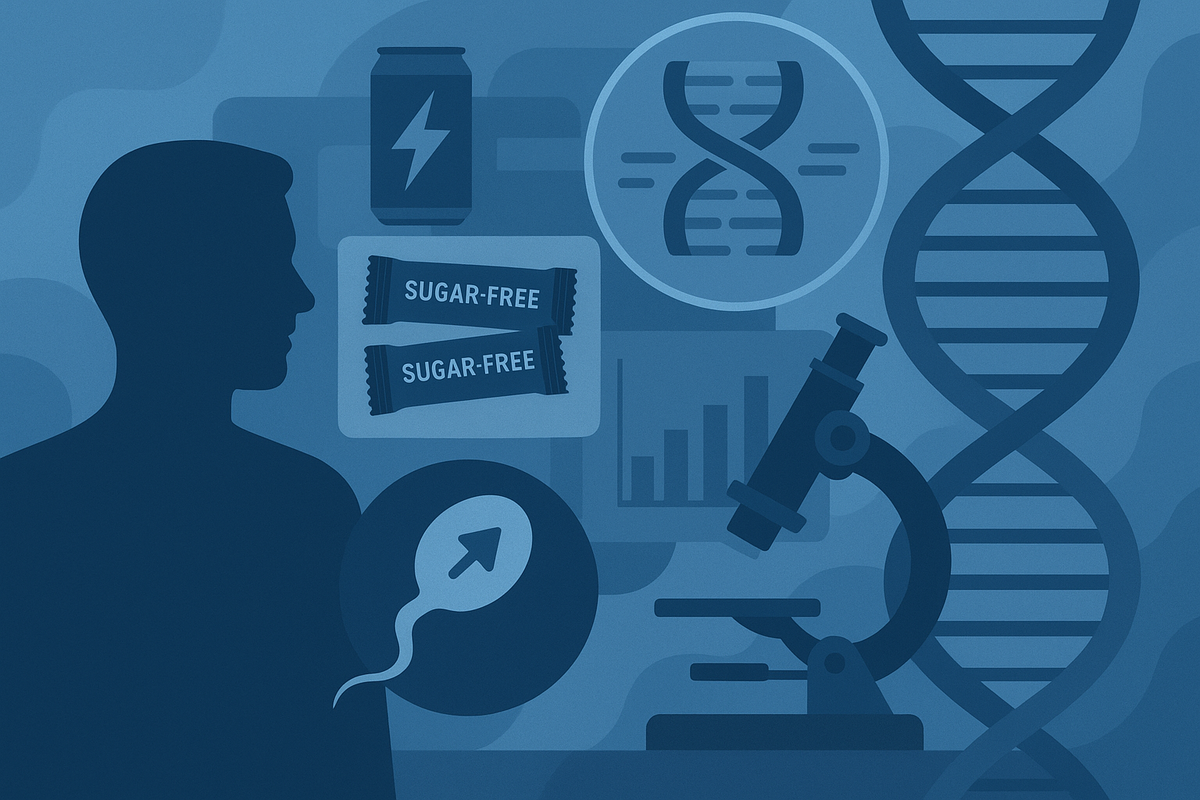The Man-Made Infertility Crisis: The Impact of Artificial Sweeteners and Genetics

The male fertility crisis is a growing, invisible epidemic that threatens future generations. While many people believe that the declining rates of reproduction are simply a lifestyle choice, an increasing number of people opting out of having children, the reality is far darker. The cause isn't a conscious decision to avoid parenthood, but rather a widespread, man-made crisis driven by genetics and environmental factors, particularly artificial sweeteners.
While sugar is often vilified as the cause of modern health problems, the truth is that artificial sweeteners, especially those found in 75% of processed foods and over 59% of energy drinks, are even more harmful, particularly for people with specific genetic vulnerabilities. These sweeteners have been marketed as healthier alternatives since the 1980s, training generations to believe that sugar-free options are better for health. But behind this message lies a toxic truth. For those carrying the TT or TC variants of the rs4880 SNP in the SOD2 gene, artificial sweeteners act as a poison, accelerating chronic oxidative stress and triggering a cascade of health issues, including infertility.
SOD Sciences Inc. plays a critical role in identifying individuals who are genetically predisposed to the damage caused by these toxins. Their genetic testing services provide early detection for those at higher risk, helping to mitigate the long-term effects of oxidative stress and preserving male fertility.
The Link Between Artificial Sweeteners and Male Fertility Decline
Artificial sweeteners are now ubiquitous, especially in energy drinks, which have become a staple for individuals aged 15-40. These sweeteners, such as sucralose and aspartame, are heavily marketed as healthier alternatives to sugar, fueling a widespread belief that "sugar-free" is better. But this advertising, which has shaped public perception since the 1980s, is misleading. The reality is that these sweeteners, while promoted as diabetic-friendly, are damaging to health, especially for those genetically predisposed to oxidative stress.
It has become increasingly obvious that a single disease process, chronic oxidative stress (including nitrogen stress), underpins a wide range of modern health issues. Sleep apnea, cardiovascular disease, obesity, Type 2 diabetes, autoimmune diseases, and neurological disorders all fall under this umbrella. These conditions share a common pathophysiological mechanism, and the rise in artificial sweetener consumption exacerbates the problem, particularly for people carrying the TT or TC genotypes of the rs4880 SNP in the SOD2 gene.
This genetic variant makes individuals more susceptible to oxidative damage, and long-term exposure to artificial sweeteners tips them into a cascade of health issues, with infertility being one of the most significant consequences.
Biological Impact of Artificial Sweeteners
Studies have shown that artificial sweeteners trigger oxidative stress within just 72 hours of consumption. This stress directly affects sperm production by damaging the testes, the organs responsible for sperm generation. The oxidative damage caused by these sweeteners compounds with genetic predispositions, such as the TT or TC genotypes of the SOD2 gene, making certain individuals more susceptible to these harmful effects.
These genetically vulnerable individuals are at a significantly higher risk of infertility, and the widespread use of artificial sweeteners only accelerates this crisis. The poisoning effect, although gradual, is insidious and it is happening to a generation that is unknowingly ingesting these toxic chemicals in the name of health.
Declining Male Fertility: Data and Evidence
The evidence for male fertility decline is overwhelming. Sperm concentration, motility, and overall sperm quality have dramatically decreased over the past few decades. From 1980 to 2020, sperm concentration has dropped by 42%, and sperm motility has significantly declined. This trend mirrors the exponential rise in artificial sweetener consumption, particularly among young men.
The link between these two trends is clear: as artificial sweetener consumption has surged, so has the decline in male fertility. The situation is even more alarming when you consider the rise of related health issues such as obesity, sleep apnea, and Type 2 diabetes, conditions that are often exacerbated by artificial sweeteners and directly affect sperm quality.
The Role of Advertising
Advertising has played a crucial role in the proliferation of artificial sweeteners. Products marketed as "suitable for diabetics" and "sugar-free" have been positioned as healthier alternatives to sugar-laden options, despite the toxic effects they have on reproductive health. The result is a generation of men who have unknowingly ingested a poison in the name of health, further exacerbating the fertility crisis.
The Genetic Mechanism: SOD2 and GPX1 Gene Variants
Genetic variants in antioxidant genes like SOD2 (superoxide dismutase 2) and GPX1 (glutathione peroxidase 1) are critical factors in how the body handles oxidative stress. The SOD2 rs4880 TT genotype, in particular, has been shown to reduce the body’s ability to protect against oxidative damage. Men carrying the TT variant are at a higher risk for decreased sperm quality due to reduced antioxidant activity, making them more susceptible to environmental stressors, including the oxidative damage caused by artificial sweeteners.
While some genetic variants, such as the CC allele in the SOD2 gene, are associated with better antioxidant protection, the TT genotype is linked to greater vulnerability. In populations with high frequencies of the TT genotype, such as East Asia, the risk of fertility decline is particularly pronounced, despite lower overall environmental exposure to toxins. This highlights the compounded effect of genetic susceptibility and modern lifestyle factors.
The Rising Tide of Other Health Issues
Obesity, sleep apnea, and Type 2 diabetes have reached epidemic proportions, and these conditions have a direct impact on male fertility. Studies show that men with sleep apnea, for example, experience significant reductions in sperm motility and quality due to intermittent hypoxia, a condition that disrupts oxygen supply to the testes. Similarly, metabolic syndrome, often tied to artificial sweetener consumption, damages sperm function by causing oxidative stress and disrupting hormonal balance.
The rise of these conditions is further compounded by the growing consumption of artificial sweeteners, creating a vicious cycle that accelerates the fertility crisis. The combination of poor metabolic health and oxidative stress is proving to be a deadly combination for male reproductive health.
Global Fertility Crisis
While Western countries have seen the most dramatic declines in sperm quality, the fertility crisis is becoming global in scope. As artificial sweeteners proliferate across the globe, sperm concentration is falling in non-Western countries as well, signaling that this issue is not limited to any one region. The fertility crisis is accelerating worldwide, and the full extent of the damage may not be understood until it's too late.
Proactive Measures
The key to addressing the male fertility crisis lies in early detection. Genetic testing, such as the services offered by SOD Sciences Inc., is crucial for identifying individuals at risk due to their genetic makeup. By identifying the TT and TC genotypes early, men can take proactive steps to mitigate the effects of artificial sweeteners and preserve their fertility.
For those genetically predisposed to oxidative stress, nutraceuticals can boost endogenous SOD2 levels, and help counteract the damage caused by artificial sweeteners. Manganese and selenium supplements, for example, can improve antioxidant function and reduce oxidative stress, providing a potential safeguard against further fertility decline.
The decline in male fertility is not an isolated issue, but a multi-faceted crisis fueled by genetic predispositions, artificial sweetener consumption, and rising metabolic health issues. As we continue to uncover the full impact of artificial sweeteners on male health, it's crucial that more awareness is raised about the long-term consequences of these products.
Long-Term Outlook
The decline in male fertility is not a voluntary choice, but the result of a widespread, man-made crisis. Artificial sweeteners, marketed as "sugar alternatives," are poisoning our reproductive systems, particularly for those with genetic vulnerabilities. As we continue to uncover the full extent of the damage caused by these sweeteners, it is vital to raise awareness about their toxic effects and the urgent need for genetic testing and lifestyle changes.
SOD Sciences Inc. is at the forefront of identifying individuals at risk of fertility decline. Through its advanced genetic testing and analysis, the company is providing critical information that can help men understand their genetic vulnerabilities and take proactive steps to preserve their reproductive health. By identifying those with the TT or TC genotypes of the SOD2 gene, SOD Sciences is empowering individuals to make informed decisions about their health and fertility.
The fertility crisis is a growing public health issue, and immediate action is required to address it. Research must continue, and lifestyle interventions, coupled with genetic testing, will be essential in reversing these trends. By focusing on the genetic roots of fertility decline and providing targeted, science-backed interventions, we can begin to slow, and eventually reverse, the damage that has been done by artificial sweeteners and other environmental factors.





